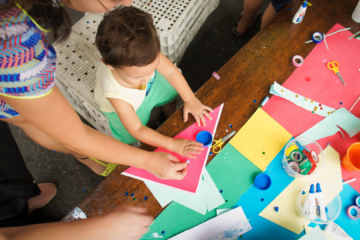As Head of Early Years at Lancers International School, I have the privilege of witnessing firsthand how daily encounters with nature cultivate curiosity, resilience, and well‐being in our youngest learners. In an increasingly digital world—where children’s lives can be highly structured and screen‐heavy—ensuring they spend regular, meaningful time outdoors is more important than ever. Building on our recent feature about sparking lifelong learning in early years, here’s a close look at how Lancers integrates nature-based learning into our curriculum and why it makes our school truly unique among the top international IB schools in Gurgaon and Delhi.
Why Nature-Based Learning Matters
Numerous studies show that children who spend regular time outdoors develop:
- Improved Concentration & Emotional Regulation: Gentle exploration in a secure outdoor environment calms young minds, helping them focus during indoor tasks.
- Enhanced Physical Health & Coordination: From climbing logs to balancing on stones, outdoor play builds gross motor skills, core strength, and stamina.
- Heightened Creativity & Problem-Solving: When a child discovers a crawling beetle or notice a budding flower, they’re prompted to ask questions and think imaginatively about their surroundings.
- Strong Environmental Stewardship: Early, hands-on experiences with plants, insects, and seasons instill a sense of wonder—and responsibility—toward our planet.
At Lancers, our Outdoor programme and classrooms harness these benefits by placing nature at the very heart of a child’s day. Whether collecting dew-dappled leaves, observing garden birds, or sketching tree bark patterns, children learn in a way that is engaging, memorable, and wholly child-centred.
“Children who engage regularly with nature show better emotional balance, more resilience, and a deeper understanding of their environment.”
– Early Years Lead, Lancers International School
What Makes Lancers Unique in Nature Integration
- Dedicated Nature Zone:
Nestled within our lush campus in DLF Phase 5, the Nature Zone is a secure, fenced-in area where students explore woodlands, build natural shelters, and forage for seasonal materials. Our trained facilitators guide children through scaffolded risk activities—from safe den-building to gentle fire-safety exercises—that encourage independence while maintaining rigorous safety standards. - Outdoor Classroom & Sensory Trails:
Each Pre-Prep class has a weekly session in our open-air classroom, furnished with log stools, natural arte facts, and a chalkboard under a canopy of trees. Adjacent sensory trails feature herbs, butterfly-attracting flowers, and tactile elements (pebbles, sand pits, moss patches) designed to sharpen young learners’ observational skills and ignite wonder at the living world. - Integrated IB PYP Units of Inquiry:
Grounded in the Primary Years Programme (PYP) framework, our inquiry units incorporate nature naturally. For example:- “How We Organize Ourselves”: Children build mini-greenhouses using recycled materials, learning about plant life cycles, resource management, and sustainability.
- “Sharing the Planet”: Students create bug hotels, observe insect behaviours, and discuss human impacts on ecosystems—fostering ethical awareness and global citizenship in the true spirit of an international IB school in Gurgaon.
- Nutrition & Gardening Lab:
Every Early Years cohort tends to its own herb and vegetable patch. Planting seedlings, measuring growth, and harvesting produce reinforce early numeracy and scientific thinking. As children prepare small snacks from their harvest, they develop healthy eating habits and understand “farm-to-table” in a tangible way. - Mindfulness & Well-Being Circles:
Each morning, our young learners gather in a circle beneath the canopy to practice simple mindfulness activities—listening to birdsong, breathing exercises, and guided “nature walks” that encourage them to notice smells, textures, and sounds. This ritual fosters self-awareness, emotional intelligence, and a calm, ready-to-learn mind.
Ways to Embed Nature at Home (Lancers Tips for Parents)
- Daily Nature Walks:
Even a 10-minute stroll to school can become an exploration—encourage your child to spot different leaves, identify bird calls, or collect small twigs for a “nature collage.” - Weekend Garden Journaling:
Provide a simple notebook for children to sketch plants, chart the weather, or press flowers. These observations reinforce literacy, science skills, and a sense of ownership over their learning. - Create a Mini Wildlife Haven:
In your balcony or backyard, arrange pinecones, stones, and repurposed containers to host insects and birds. Your child can monitor visitors, fostering empathy and an understanding of biodiversity. - Seasonal Foraging & Cooking:
Introduce safe, local edible finds—mango blossoms in spring or berries in summer—and involve children in simple cooking. This practice links science, nutrition, and responsibility in a fun, hands-on way. - Screen-Free Nature Days:
Designate one weekend afternoon for park visits, nature crafts (leaf rubbings, flower pressing), or outdoor storytelling. These gentle routines build lasting appreciation for the outdoors.
Preparing Future-Ready, Ethical Global Citizens
At Lancers International School—proudly counted among the best international IB schools in India—we understand that an education rooted in nature equips children not only with academic skills, but also with ethical awareness, emotional resilience, and a lifelong love of learning. By embedding forest school principles and nature-rich experiences into every aspect of our Early Years Programme, we create a child-centred, joyful environment where each young learner can thrive.
If you seek an early education that balances international IB rigour with nature-based wonder, Lancers is the place to begin your child’s journey. Join us in nurturing curious minds—one leaf, one bird song, one discovery at a time.


